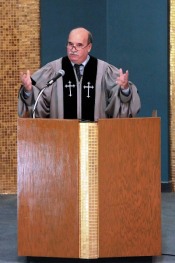 It used to be the case that dispensational prophecy writers attempted to justify their unique interpretation of the prophetic portions of the Bible, by correlating current events with relevant biblical passages. Dispensational prophecy experts possess an uncanny ability to deftly explain the most consequential events in the evening news or morning headline on Drudge, as enabled by their distinctive system of biblical interpretation. Every natural disaster, war, or plague, can be used to prove the Rapture is near. This gives the Bible relevance, we are told, and it also proves that the dispensational understanding of the Bible is the correct one. The Bible predicts and explains current events.
It used to be the case that dispensational prophecy writers attempted to justify their unique interpretation of the prophetic portions of the Bible, by correlating current events with relevant biblical passages. Dispensational prophecy experts possess an uncanny ability to deftly explain the most consequential events in the evening news or morning headline on Drudge, as enabled by their distinctive system of biblical interpretation. Every natural disaster, war, or plague, can be used to prove the Rapture is near. This gives the Bible relevance, we are told, and it also proves that the dispensational understanding of the Bible is the correct one. The Bible predicts and explains current events.
Admittedly, the Book of Revelation is difficult to understand. The book is full of symbols, numbers, and references to both obscure and well-known prophecies from the Old Testament. Yet, dispensationalists have been quite eager to introduce, interpret, and explain this mysterious Book of Revelation to those interested in politics and world affairs, by claiming John's Apocalypse is "history written in advance."
According to the dispensational understanding of Revelation, the Apostle John is foretelling the terrible things to be unleashed upon the earth after the church is supposedly removed from the scene, at or near the beginning of the seven year tribulation period. Dispensationalists tell us that in Revelation 4:1, when John hears a voice saying "come up here," he is referring to the Rapture. Therefore, everything which follows in the Book of Revelation is an account of what will happen after the Antichrist makes a peace treaty with Israel, as the Gentile church (now raptured) awaits with the Lord his return from heaven.
Dispensationalists claim that they find all of this in the Book of Revelation, because they interpret the book "literally," while the dreaded amillennarians (like me) "spiritualize" Bible prophecy, enabling us to explain away the otherwise obvious dispensational interpretation of the Book of Revelation.
Over the course of my adult life, this was a debate both sides (dispenationalists and amillennarians) thought worth having. In fact, I'm still engaged in it.
So, you can imagine my surprise when I ran across a recent interview with Dr. David Jeremiah, the well-known dispensational writer and pastoral successor to Tim LaHaye (Interview with Dr. David Jeremiah). In discussing his newest book, Agents of the Apocalypse, Dr. Jeremiah offers a very surprising justification for introducing fictional characters into a book explaining the meaning of Revelation to the American masses.
Dr. Jeremiah tells the interviewer,
"We took 10 characters from the Book of Revelation and told the story of that book built around those individual characters or groups of characters and we introduced every chapter with a fictional element that drives this down into the hearts of people," the California megachurch pastor explained. "It's really been fun to see how it's opened up this book (Revelation) to so many people."
The characters and groups that begin each chapter of Agents of the Apocalypse, published in October, include "The Exile," "The Martyrs," "The Two Witnesses," "The Dragon," "The King," and several others, including the two "beasts," one from the sea and another from the earth.
Dr. Jeremiah contends that the best way to explain the Book of Revelation is by introducing fictional characters so as to "drive the message down into the hearts of people," and to open this book (Revelation) "to so many people." I'm surprised at Dr. Jeremiah's justification for doing this because I always thought that the heart of the defense for reading Revelation through a dispensational lens, is that biblical prophecy only makes sense when interpreted "literally."
Why would Dr. Jeremiah move from a popular-styled verse by verse exposition of the text, as dispensationalists have done for years, to introducing fictional characters to help us understand it better and drive its message home? I'm having trouble seeing the logic in this.
No doubt, the main reason is that the LaHaye/Jenkins Left Behind series paved the way for successive waves of Christian fiction focusing upon end times. Even the self-professed "Bible Answer Man," Hank Hanegraaff, jumped into the lucrative Christian fiction market with an anti-dispensational series of novels tied to the Fall of Jerusalem in A.D. 70 (The Last Disciple). The Left Behind novels were unashamedly marketed as Christian fiction, and although they were overtly dispensational in their theology, they were not offering commentary on a specific book of the Bible.
I get that Dr. Jeremiah is using fictional characters as a literary device to explain and articulate the dispensational reading of the Apocalypse. Yet does not this approach fly in the face of the long-standing dispensational presupposition that we must read the Book of Revelation literally to ensure that we do not spiritualize its meaning? How is the introduction of fictional characters not spiritualizing biblical prophecy? How is this not a serious undermining of the very reason why Dr. Jeremiah interprets Revelation as he does in the first place?
I guess I shouldn't be surprised that Tim LaHaye's successor, of all people, would be so unapologetic for using fictional characters to explain his "literal" understanding of biblical prophecy. Jeremiah adds,
"these are really cool characters that we created. Judas Christopher is the name we gave to the anti-Christ, the one who's going to come and take over control of the world. Damon Detherow is the false prophet who is his religious and economic czar."
When I think about it, giving the Antichrist and false prophet fictional names and seeing them as "cool characters" is but another way of doing what dispensationalists have always done--attempting to interpret the Bible in light of current events. But when there are not obvious candidates for the Antichrist and False Prophets in the evening news, why not just make up substitutes who do the same thing dispensationalists expect to happen at the time of the end?
I hope my dispensational friends can see the irony that we spiritualizing amillennarians strive to resist such efforts to explain Revelation through any means other than interpreting Scripture by Scripture (Harold Camping aside). We work from clear passages to harder texts. Striving to read the Book of Revelation through the broader lens of redemptive history, amillennarians believe the Book of Revelation is a divine commentary on those Old Testament prophecies which find their fulfillment in Christ at both his first and second advents. The key to interpreting the symbols in the Book of Revelation is to determine how they are used in the Old Testament. The apocalypse clearly reflects the already-not yet tension found throughout New Testament eschatology.
Fictional characters cannot help us understand this book--but real biblical characters (like those in the Old Testament) can. Shouldn't we turn to them first? Granted, some amillennarians have tied the Antichrist to current events and historical personages, such as the papacy during the Reformation and post-Reformation periods. Yet in most cases, Reformed writers avoid identifying a particular Pope as "the" Antichrist.
Many more have embraced the wise counsel of Geerhardus Vos, who warned Christians that there will be a number of end-times prophecies we simply cannot fully understand until they are fulfilled--but this will be at that time when the Lord returns, when all prophetic speculation is no longer an issue.
Using fictional characters to "explain" the Book of Revelation is the last thing I would expect a dispensationalist prophecy expert to do. I guess the times have changed. Fiction sells.
 Sunday, December 7, 2014 at 03:58PM
Sunday, December 7, 2014 at 03:58PM  Exploring the Doctrine of the Trinity
Exploring the Doctrine of the Trinity






